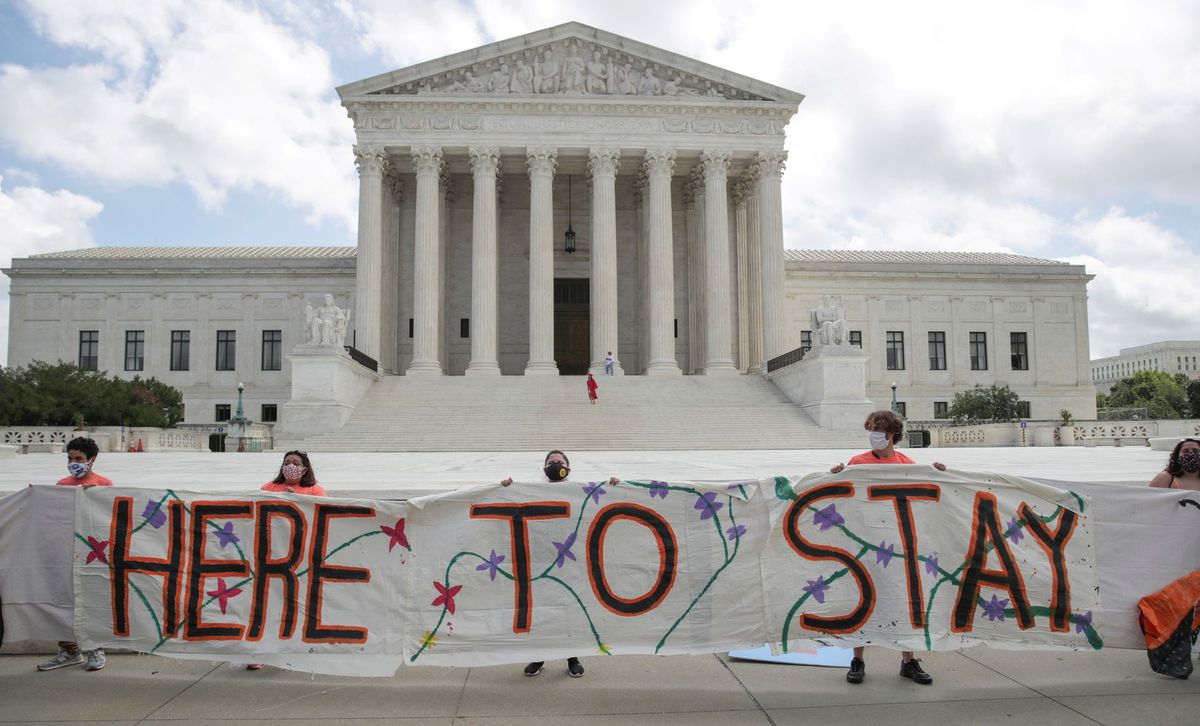A recent Supreme Court decision has bought extra time for many undocumented immigrants in the US

A few minutes every morning is all you need.
Stay up to date on the world's Headlines and Human Stories. It's fun, it's factual, it's fluff-free.
The case involved two somewhat obscure laws: the “non-LPR cancellation of removal” clause of the Immigration & Nationality Act (INA) and the so-called “stop-time” rule.
- On April 29, the United States Supreme Court sided with an undocumented Guatemalan immigrant who was looking to avoid his removal from the country.
- The petitioner (or defendant) in the case was Agusto Niz-Chavez, who has been in the country illegally since 2005.
- The unexpected decision by the Supreme Court involved half of its conservative bloc siding with the three liberal Justices.
- The case involved two somewhat obscure laws: the “non-LPR cancellation of removal” clause of the Immigration & Nationality Act (INA) and the so-called “stop-time” rule.
Who is Agusto Niz-Chavez?
- Niz-Chavez arrived in the US from Guatemala in 2005 without legal documentation.
- In 2013, Niz-Chavez was pulled over by the police while driving a car with a broken taillight and was discovered to be in the country illegally.
- That initiated deportation proceedings, with Niz-Chavez receiving notice to appear in court for a deportation hearing.
- But the original notice to appear did not include all the relevant information. A second notice provided the time and place of the hearing,
- Niz-Chavez contended that because the initial notice did not have all the necessary evidence, he shouldn’t be deported.
- The Supreme Court, in a 6-3 vote, agreed with Niz-Chavez.
- He will now be allowed to stay in the country.
What was the thinking behind the Supreme Court’s decision?
- To understand the Supreme Court’s decision, we need to go back and learn about two related immigration laws.
- The first is the non-LPR cancellation of removal clause, which provides a pathway for undocumented immigrants to gain legal residency.
- Simply put, this clause allows someone who is in the country illegally to petition the government to be allowed to stay.
- That person must meet four criteria: They must have been in the country continuously for 10 years, they must have been “of good moral character during such period,” they must not have broken the law and they must prove their removal would cause “unusual hardship” to a family member who is legally in the country
- If Niz-Chavez could prove he met all four criteria, as of 2015, he could have petitioned the government to stay in the US.
- However, because he was pulled over by the police in 2013, that technically initiated something known as the “stop-time” rule.
- Essentially, this rule is like a pause button on a person’s 10 years. That pause happens when the person receives their notice to appear in deportation court.
- Luckily for Niz-Chavez, the Supreme Court decided that since a notice to appear is only valid if it includes all relevant information, the stop-time didn’t begin for him.
How did the Justices vote?
- In Niz-Chavez v. Garland (with “Garland” referencing Attorney General Merrick Garland), the Supreme Court overturned the decision of multiple lower courts.
- The previous courts had all denied Niz-Chavez’s petition to not be removed.
- The important question the Supreme Court had to determine was whether the government can provide relevant information in multiple deportation notices, or if it must do so in a single document.
- Six Justices determined the information must be in a single document: Justices Neil Gorsuch (who wrote the decision), Amy Coney Barrett, Stephen Breyer, Elena Kagan, Sonia Sotomayor and Clarence Thomas.
- In a summary of the Court’s decision, Gorsuch wrote, “When the federal government seeks a procedural advantage against an individual, it will at least supply him with a single and reasonably comprehensive statement of the nature of the proceedings against him.”
- In his dissent, Justice Brett Kavanaugh, also writing for Chief Justice John Roberts and Justice Samuel Alito, argued the decision would “impose substantial costs and burdens on the immigration system.”
- Legal experts now believe that the Court’s decision will buy time for other undocumented immigrants who find themselves in Niz-Chavez’s situation.
Have a tip or story? Get in touch with our reporters at tips@themilsource.com




Comments ()